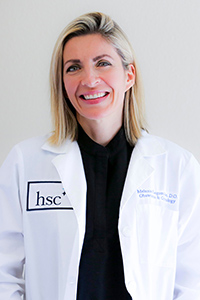HSC Experts: Flu vaccine is ‘essential component of prenatal care’
By Kathryn Lytton and Diane Smith

Traci Benson is matter-of-fact about protecting herself from the flu.
This year, there is added incentive – she is an expectant mother trying to protect her baby.
“It’s 100% important, especially with COVID happening right now,” said Benson, a referral management trainer whose due date is May 6.
Benson, who gets flu shot every year, got a vaccine earlier this fall. Health experts at The University of North Texas Health Science Center at Fort Worth are hoping more expectant mothers follow Benson’s example.
The message to mothers-to-be? It is critical to get a flu shot every season, but this year there is added concern because of the COVID-19 pandemic.
As we enter the flu season, we recommend all pregnant women to obtain their inactivated vaccine as soon as possible,” said Dr. Melanie Lagomichos, DO, FACOG, an ob-gyn at HSC Health Obstetrics and Gynecology and assistant professor of obstetrics and gynecology at the Texas College of Osteopathic Medicine (TCOM).
“Pregnant women, who get the flu, are at higher risk of ICU admissions and adverse outcomes than the general population. Especially now with COVID-19 in the mix, it is all the more important to protect yourself against other viral illnesses,” she said.
Dr. Lagomichos said expectant mothers can get the flu shot anytime during a pregnancy, adding: “Flu vaccination is essential for you and your baby.”
Protection against the seasonal flu
The American College of Obstetricians and Gynecologists (ACOG) states that maternal influenza immunization is an essential component of prenatal care for women and their newborns.
Dr. Lagomichos said numerous studies, including clinical trials and observational studies, and data from safety reporting systems have demonstrated consistently the safety of influenza vaccination during pregnancy.
Pregnant women are particularly vulnerable to influenza infection and its resulting morbidities; therefore, influenza vaccination is an integral element of pre-pregnancy, prenatal and postpartum care, she said.
One study, during the 2012–2013 influenza season, demonstrated that pregnant women who were vaccinated had significantly fewer hospitalizations than those who were not, Dr. Lagomichos said.
People with a history of egg allergy, who have experienced only hives after exposure to egg, can receive any licensed and recommended influenza vaccine that is otherwise appropriate for their age and health status, Dr. Lagomichos said. Currently, pregnant women should receive any licensed, recommended, age-appropriate, inactivated influenza vaccine during any trimester, she added.
It is also safe for breastfeeding women to receive the influenza vaccine if they did not receive it during pregnancy, Dr. Lagomichos said.
Extra precaution during COVID-19 pandemic
Pregnant women with COVID-19 are at increased risk for more severe symptoms than non-pregnant women, Dr. Lagomichos said.
“This is especially true for pregnant women with risk factors such as diabetes, obesity and other comorbidities,” Dr. Lagomichos said “That being said, the absolute risk of COVID-19 infection is still significantly lower than the risk of flu in pregnancy. Since we have a vaccine for flu, we continue to recommend getting your flu shot as soon as possible to help mitigate that risk.”
Health experts recommend that expectant mothers follow precautions implemented to prevent COVID-19, including avoiding public places and social distancing.
“We also recommend continuing to wear your mask and frequent hand washing as we approach a season filled with possible COVID-19 and flu exposures,” Dr. Lagomichos said.
Pregnant women should limit social gatherings and public spaces.
“Many of us are getting stir-crazy being inside, however, the biggest transmission risk comes from close exposure with family and friends,” Dr. Lagomichos said.
Many grocery stores continue to have reserved times specifically for higher risk populations to shop, and that category includes pregnant women.
“The risk of ICU admission in pregnancy due to the flu can be up to seven times higher than the average population,” Dr. Lagomichos said. “Also, limiting exposure of the newborn early on is key. Advising family to postpone visits especially early on will help reduce possible detrimental exposure to newborn infants whose immune systems have not yet fully developed.”
Mom-to-be Benson said she is trying to protect herself from the flu and COVID-19.
“I’m working remotely until further notice, we practice social distancing and have since March, extra hand washing, Lysol surfaces often, wearing a mask, using hand sanitizer any time I touch a new surface.”
Jennifer Nanni, MEd, Director of Alumni Relations at the HSC Office of Institutional Advancement, is also an expectant mother trying to protect herself from the flu and COVID-19.
Nanni, who got a flu shot on the HSC campus, said she gets the vaccine every year because she tends to get sick easily.
“Being pregnant, you already have a thousand things to worry about when it comes to protecting your baby,” Nanni said. “I want to make sure I am doing everything I can to stay healthy and not put her life (and my life) at risk. Besides, you are limited as to what medicine you can take when you are pregnant. Who really wants to get sick and be miserable?!”
Nanni, whose due date is Feb. 18, said it important to protect herself from both viruses.
“I want to do everything I can to protect the both of us. Plus, I want to be able to spend time with our baby after delivery and so it is imperative we all (husband, baby and I) stay healthy,” she said.






Social media